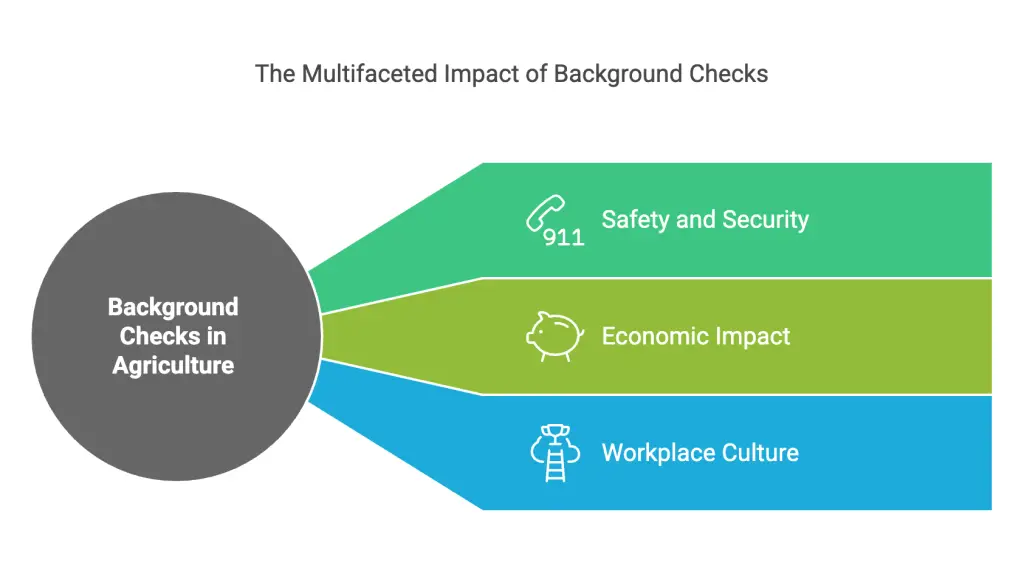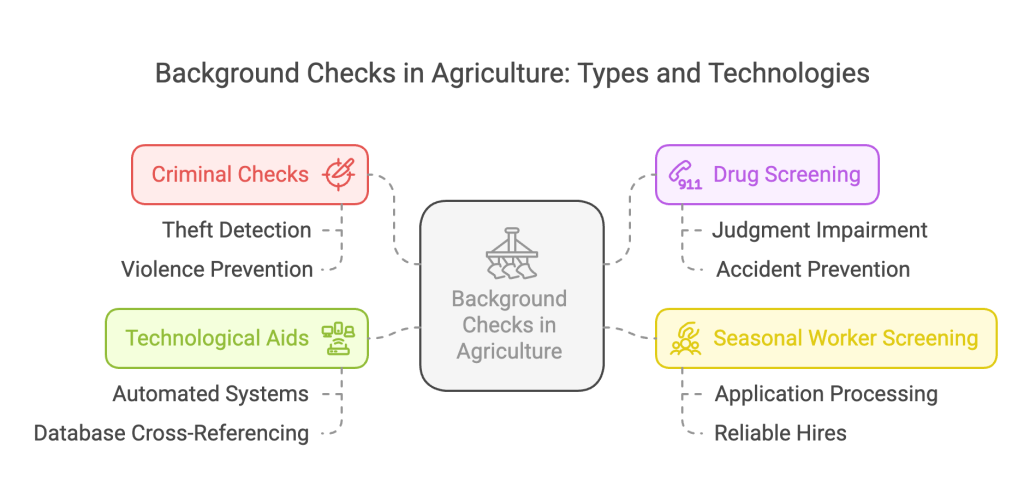In Georgia's vibrant agricultural sector, maintaining workforce integrity is paramount. Given the varied demands and seasonal nature of agricultural work, background checks play a crucial role in ensuring that the workforce is qualified, reliable, and law-abiding. This article delves deep into how background checks are implemented within Georgia's agriculture industry, highlighting their significance, the processes involved, and strategies for effective implementation.
Key Takeaways
- Background checks play a critical role in ensuring a safe and reliable workforce in Georgia's agricultural sector.
- Implementing thorough screening processes can help reduce workplace incidents and improve overall operational safety.
- Automated background check systems enhance efficiency and accuracy, especially during peak hiring seasons.
- Legal compliance with federal and state regulations ensures fair hiring practices and protects both employers and applicants.
- Embracing technology and clear communication during the background check process can strengthen trust and streamline hiring in agriculture.
Introduction
Agriculture is the backbone of Georgia's economy, generating billions in revenue and providing employment to a vast number of individuals. From peaches to peanuts, this sector requires a reliable workforce to maintain its productivity and growth. However, the nature of agricultural work, often seasonal and involving hazardous equipment, mandates stringent measures to ensure worker safety and integrity.
Background checks have become essential in agriculture to safeguard operations and ensure legal compliance. These screenings help employers verify that potential hires are qualified and do not pose risks to workplace safety. By identifying criminal history, substance abuse issues, or falsified credentials, background checks can prevent costly mishaps and legal troubles.
This article will explore the different facets of implementing background checks in Georgia's agricultural sector. We'll delve into the legal requirements, discuss best practices, and examine the impact these checks have on hiring and compliance. We'll also highlight expert-approved strategies to optimize background screening processes for agricultural employers.
The Necessity of Background Checks in Agriculture
Safety and security take precedence in any work setting, especially in agriculture. The use of heavy machinery and the handling of potentially hazardous materials make it vital to know who is on your team. Background checks help mitigate risks by flagging individuals with histories that might pose a danger to others or themselves on the job. You donât want someone with a history of reckless behavior operating a combine or handling pesticides.

Consider the economic impact of ignoring thorough background checks. For instance, hiring an untrustworthy employee might lead to theft of equipment or produce. These are not just financial hits; they disrupt operations and morale. Even more severe, hiring someone with a violent criminal background could lead to serious safety issues. This isnât just speculationâthere are documented cases of workplace incidents that could have been avoided with proper screening.
These checks also promote a culture of responsibility and care. When employees know that background checks are a staple in hiring practices, it encourages a higher standard of behavior. They understand that the position demands reliability, which can enhance overall workplace culture and productivity.
Hiring someone is more than just filling a role. Itâs an investment in safety, productivity, and peace of mind. So, how much value do you place on ensuring your team is composed of individuals who not only have the right skills but are also trustworthy?
Process of Conducting Background Checks
Background checks in agriculture are essential for maintaining a safe and efficient workforce. Let's consider the main types you'll encounter:
Criminal Checks: In agriculture, criminal history screening helps identify red flags, such as theft or violence. This is crucial, given the operating environment includes expensive equipment and team collaboration. Ensuring a clean record can avert potential disruptions caused by criminal behavior.
Drug Screening: Drug use can impair judgment and lead to accidents, especially when operating heavy machinery. Georgia mandates certain drug testing protocols to maintain workplace safety. Regular screening helps ensure that those involved in the agricultural sector meet the required standards for a safe and productive work environment.
Seasonal Worker Screening: Agriculture often relies on an influx of workers during peak seasons. This means processing large volumes of applications quickly. Background checks help balance speed with thoroughness, ensuring reliable hires without slowing down operations. Effective background screenings during these critical times can foster a workforce that meets both quantity and quality needs.
Technological Aids: Technology plays a pivotal role in streamlining background checks. Automated systems can quickly cross-reference databases for criminal records or past employment. This reduces manual errors and speeds up the hiring process. By leveraging technology, you can improve accuracy and efficiency in finding qualified candidates.

Using these methods strategically helps keep Georgia's agricultural workforce safe, compliant, and ready to meet the demands of the industry. Happy hiring!
Legal and Compliance Aspects
Understanding the legal framework for background checks in Georgia's agriculture sector is crucial. Federal laws, such as the Fair Credit Reporting Act (FCRA), set standards for how background checks must be conducted nationally. They require employers to obtain written consent from applicants before conducting checks, and to inform them if any adverse decisions result from the findings.
State laws in Georgia add specific layers of compliance. For instance, the Georgia Crime Information Center (GCIC) regulates access to criminal history records, and licensees must adhere to state guidelines when accessing such data. It's important for employers to differentiate between permissible types of background checks under federal and state law, ensuring they're both effective and legal.
Employment law in Georgia further dictates how companies engage with applicants during the hiring process. Employers must ensure their hiring practices, including background checks, comply with Title VII of the Civil Rights Act, which safeguards against discriminatory practices. This means background checks should not disproportionately exclude certain demographic groups unless the exclusions are job-related and consistent with business necessity.
Privacy and consent are crucial in this process. Employers must handle background checks with care, keeping applicant information confidential. Failing to comply with consent requirements, such as not properly disclosing the nature and scope of the inquiry or not obtaining the necessary authorization, can lead to legal consequences and undermine trust with potential hires.
By maintaining strict adherence to these legal requirements, agricultural businesses in Georgia not only shield themselves from penalties but also foster a fair and transparent hiring environment. Are your practices up to code? Ensuring compliance might be your next strategic move.
HR Best Practices in Background Screening
When it comes to hiring in agriculture, prioritizing safety is key. Start by embedding background checks into your safety strategy. Make screenings a part of your standard hiring process to reduce risks associated with operating heavy equipment and handling hazardous materials.
For job seekers, transparency is crucial. Be upfront about the processes involved. This can ease anxiety and foster trust between you and potential employers. Understanding what background checks entail can help position you as a prepared and informed candidate.
To maintain efficiency, especially during peak seasons, automate where possible. Use software tools that streamline the screening process and integrate with your existing systems. This reduces processing time and ensures accuracy.
Timeliness is another factor. Delays in background checks can slow down hiring. Set clear timelines for completing checks, and work with vendors who can deliver fast results without compromising quality.
Remember that accuracy is non-negotiable. Double-check information against multiple sources to verify its authenticity. This reduces the risk of errors and the potential for hiring the wrong person.
By adopting these best practices, you can ensure that your hiring process is not only compliant but also efficient and trustworthy.
Challenges and Solutions
When it comes to background checks in agriculture, challenges abound, but solutions are within reach.
Let's tackle social dimensions first. Bias can creep into screening processes, potentially unfairly affecting certain groups. To counter this, you need to ensure transparency and consistency. Standardize your criteria and train staff on unconscious bias. Implementing blind hiring processes where possible can also help level the playing field.
Now, onto technological integration. While technology streamlines background checks, it also poses challenges like data security risks and system compatibility issues. Protect your applicants' data by staying updated on cybersecurity measures and investing in systems that offer secure encryption. For system interoperability, choose platforms that easily integrate with existing HR systems to minimize lag and errors.
Scaling up during peak seasons is another hurdle. Some HR departments struggle here, mainly due to limited resources. To mitigate this, consider automating certain parts of the screening process to handle larger volumes efficiently. Partnering with third-party firms for background checks during these times can also be a practical solution, allowing your core team to focus on other recruitment aspects.
Each challenge demands strategic thinking and a proactive approach. Are you ready to implement these solutions in your workplace?
Data-Driven Insights
Numbers support what experience has taught usâbackground checks work. Consider the data: farms implementing thorough screening processes have reported a 30% reduction in workplace incidents. This statistic alone speaks volumes about the tangible benefits of rigorous background checks.
The trend is clear across the industry. More farms in Georgia have turned to advanced screening techniques, leveraging data analytics to spot potential issues before they arise. This proactive approach not only enhances safety but also boosts overall productivity.
Let's look at a real-world example that showcases success. One of Georgia's major peach farms decided to refine its hiring process by incorporating comprehensive background checks. This change led to a marked decrease in equipment theft and improved labor efficiency during the harvest season. Not just statistics, but real change in how operations are run.
You might wonder how these practices scale during peak seasons. Technology plays a crucial role here. Many businesses now utilize digital platforms that streamline and expedite the background check process, ensuring that high applicant volumes don't cause delays.
The question for you is: How can these insights reshape your approach to hiring in agriculture? Implementing data-driven strategies may not just be beneficialâit might be essential for staying competitive and compliant.
Conclusion
Background checks serve as a crucial line of defense in maintaining a qualified, reliable, and safe workforce. They help identify potential risks, safeguard against fraud, and ensure compliance with both state and federal regulations. By doing so, they protect not just the industry but the community at large.
With advancements in digital tools, the future of background checks looks promising. Automated systems can streamline the process, reducing time and effort, while staying compliant with evolving legal standards. Legislative changes will likely continue to refine how background checks are conducted, ensuring privacy is respected without sacrificing security.
HR professionals should focus on integrating background checks tightly with their hiring strategies. This involves not just using technology wisely but fostering an environment of transparency with job seekers. Clear communication about the background check process can enhance trust and streamline hiring. Adjusting these practices will help build a workforce that meets the high standards necessary for Georgiaâs agricultural industry.
Frequently Asked Questions (FAQs)
What background checks are required for agricultural workers in Georgia?
Background checks for agricultural workers may include verification of work authorization, identity verification, and criminal history checks. The specifics can vary depending on the employer and the role.
Do seasonal farm workers in Georgia undergo drug testing?
Some employers may require drug testing for seasonal farm workers, but it's not a universal practice across all agricultural jobs in Georgia. It's best to ask the employer directly about their requirements.
How can Georgia farmers screen workers efficiently during peak seasons?
Farmers can benefit from using digital platforms that streamline the application and screening process. Employing agencies that specialize in agricultural labor can also expedite background checks and worker verification.
Are criminal checks mandatory for farm jobs in Georgia?
Criminal checks are not universally mandatory for farm jobs, but many employers opt to conduct them as part of their hiring processes to ensure safety and compliance with regulations.
What safety measures depend on background checks in Georgiaâs agriculture sector?
Background checks help enhance safety by ensuring that workers do not have a history of offenses that could pose a threat to the workplace or others. This helps maintain a secure environment for all employees.
How can job seekers prepare for farm job background checks in Georgia?
Ensure all personal identification is accurate and updated. Be honest in your application and have explanations ready for any discrepancies. Familiarize yourself with the employer's background check process.
What kind of identification documents are typically needed for farm job applications in Georgia?
You will likely need a government-issued ID, Social Security card, and any documentation that proves your right to work in the U.S., such as a work visa or green card.
Are there any age restrictions for agricultural work in Georgia?
Yes, federal and state laws generally restrict certain hazardous agricultural tasks to workers over 16, with some exceptions for family farms.
Do Georgia farmers offer any training prior to employment?
Many farms offer basic safety and equipment operation training before employment. Confirm with your potential employer what training is provided.
What should employers do if a background check reveals concerning information?
Employers should follow fair hiring practices, which may include discussing the findings with the candidate to allow for clarification before making a final employment decision.
Definitions
- Employment: The process of hiring individuals to perform specific tasks in exchange for compensation. In agriculture, employment can be seasonal or long-term, depending on the type of work required.
- Workplace Safety: The policies and practices designed to prevent injury and illness in a work environment. In agriculture, this includes training on heavy machinery, handling hazardous materials, and ensuring workers are physically fit for labor-intensive tasks.
- Background Checks: A screening process used by employers to verify a candidate's history, including criminal records, employment history, and drug use. This helps ensure new hires are trustworthy and meet legal requirements.
- Hiring Process: The series of steps an employer takes to recruit and select job candidates. This typically includes reviewing applications, conducting interviews, and performing background screenings before making a final decision.
- Compliance: The act of following legal and regulatory requirements in hiring and workplace management. Employers must adhere to federal and state laws when conducting background checks to avoid legal consequences.

GCheck Editorial Team
Meet the GCheck Editorial Team, your trusted source for insightful and up-to-date information in the world of employment background checks. Committed to delivering the latest trends, best practices, and industry insights, our team is dedicated to keeping you informed.
With a passion for ensuring accuracy, compliance, and efficiency in background screening, we are your go-to experts in the field. Stay tuned for our comprehensive articles, guides, and analysis, designed to empower businesses and individuals with the knowledge they need to make informed decisions.
At GCheck, we're here to guide you through the complexities of background checks, every step of the way.





